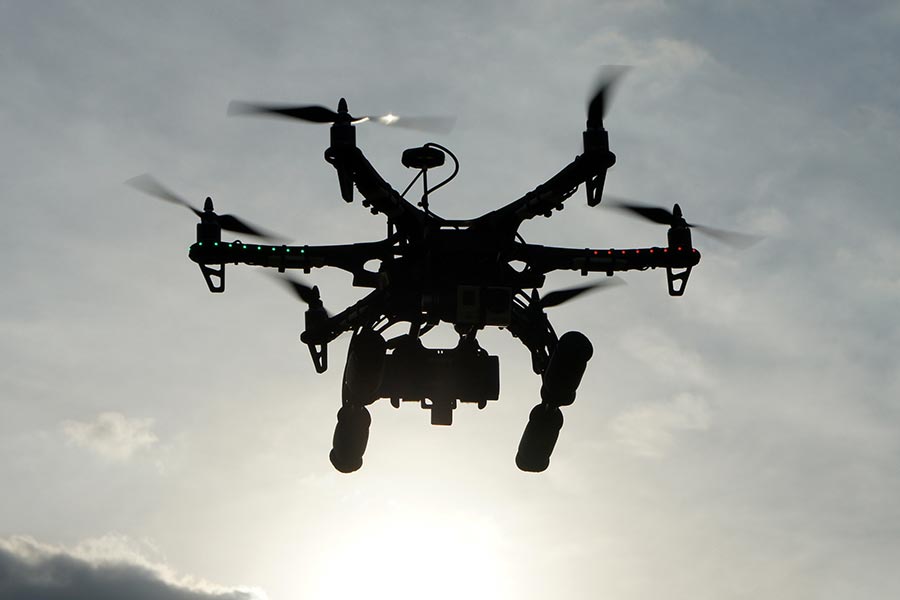Airfields across the country could be used as testing hubs for drones – but rural TDs have warned against the countryside being used as a “guinea pig” for the technology, writes Brian Mahon.
The Government published a new policy document this week on the regulation of drones which highlights the suitability of rural Ireland for “wider UAS (Unmanned Aircraft System) testing”.
Transport Minister Darragh O’Brien has talked up the opportunity to “create high-tech jobs and boost the economy across Ireland”.
But there are public concerns around noise pollution and privacy.
To date, the majority of drone testing and deliveries have happened in Dublin, where there has been significant pushback from affected residents and politicians.
Around 200 people attended a meeting in Dundrum this week over concerns surrounding a planning application for a drone delivery hub.
Now rural TDs are raising similar fears around noise, safety and privacy, as well as the added concern of the effect of flying drones on livestock.
Chair of the Oireachtas Agricultural Committee and Fianna Fáil TD in Cork North-West, Aindrias Moynihan, said: “We are not a trial space to try out your drones. We are not the guinea pigs. It would cause the same upset for someone in a rural home as it would in an urban home.
“I would imagine that the larger drones would cause upset for livestock and that would have to be something that would have to be taken into consideration.”
He said it was important to set out “clear guidelines” before they are flying out “all over the place”.
Another Government backbencher, Fine Gael TD from Offaly John Clendennen, said: “We are going to have the same issues and concerns as those that are raised in urban Ireland.
“We need it regulated accordingly. Anything of a real commercial ability is going to be of a certain scale and size and would need to be regulated appropriately.”
He also raised concerns about how they would affect livestock, remarking: “Are they going to be frightened off by this or is it going to have a knock-on effect?
“We need to be careful about how it is rolled out. We need to be conscious of these advancements and ensure we remain competitive.
“We need to do it in a way that is considerate of rural Ireland.”
However, Julie Garland, the chair of the Unmanned Aircraft Association of Ireland, said that as technology improves, “noise related to drone activities will dramatically reduce”.
She said rural Ireland is “perfect” for advance testing, with its “wide open airspace” and lack of aircraft density compared to much of Europe.
She argued this presented the State with a “unique” opportunity to become a pioneer of emerging technology.
She said: “It will all be done in a very controlled way, in a very regulated way. It allows for us to be a hub for the drone industry.”
Ms Garland highlighted Newcastlewest airfield in Wicklow was an “ideal location” for an innovation hub.
These sites would need to have a runway as well as “secure facilities/hangarage and workshops”, she said.
There are multiple active and closed down airfields and aerodromes situated across the country in counties such as Meath, Kildare, Longford, Cork, Tipperary, Clare and Donegal that could be the site for innovation in the drone industry.
She said the industry needed to grow “gradually”, adding: “This isn’t about being damaging to the air or the environment.
“To prove that the technology is safe, we need to be able to test, we have to accept that we have a lot of very rural areas that should be developed in some way.
“It has a low impact on the environment. It’s a low density industry. We have buckets of airspace and we should utilise it.”
Launching the policy this week, Fianna Fáil’s Darragh O’Brien highlighted that drones had already been used effectively in a number of areas, such as in search and rescue operations by the Irish Coast Guard.
But scepticism remains, and Fine Gael TD for Dublin Rathdown Maeve O’Connell was among those opposing the proposals for a new “test site” in Dundrum.
She said: “These ‘test sites’ will simply allow commercial operators to expand without regulation, under the guise of ‘testing’. Our communities are not test sites.”
The planning application, from drone-delivery company Manna, attracted around 200 objections.
The main concerns raised in the objections were about noise, safety, privacy, and environmental impact.
Manna already operates in Dublin 15, where it says it has made deliveries to 42,000 households over the past 18 months.

Monsignor Paul Callan of Dundrum Parish also attended the meeting to raise his concerns.
He said: “We’ve a beautiful church here in Dundrum and it’s frequented often. You see people sitting there quietly.
“There are very few places left for a bit of peace and quiet left and then right next door you have the drones and that particular noise. Our concern here is that it will be a constant.”
A spokesman for the Department of Transport said: “The Irish Aviation Authority is working with the European Union Aviation Safety Agency and other member states on developing guidelines and regulation around drone noise.”











